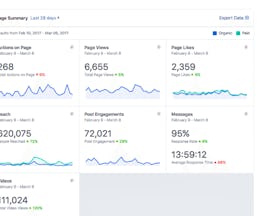Filter by
The language used throughout the course, in both instruction and assessments.
3,022 results for "marketing analytics"

ESSEC Business School
Skills you'll gain: Business Analysis, Data Analysis, Statistical Analysis, Probability & Statistics, Customer Analysis, Market Analysis, Marketing, R Programming, Data Management, Exploratory Data Analysis

IE Business School
Skills you'll gain: Marketing, Market Analysis, Strategy, Marketing Management, Market Research, Product Marketing, Brand Management, Customer Analysis, Media Strategy & Planning, Product Strategy, Strategy and Operations, People Analysis, Decision Making, Research and Design, B2B Sales, Process Analysis, Product Management, Data Analysis, Planning, Product Development, Communication

Skills you'll gain: Marketing, Business Analysis, Data Analysis, Marketing Management, Statistical Analysis, Digital Marketing, Media Strategy & Planning, Advertising, Experiment, Forecasting, Market Analysis, Market Research, Probability & Statistics, Regression, Research and Design, Statistical Tests

Coursera Project Network
Skills you'll gain: Marketing, Strategy

University of Illinois at Urbana-Champaign
Skills you'll gain: Digital Marketing, Marketing, Market Analysis, Media Strategy & Planning, Social Media, Data Analysis, Market Research, Advertising, Communication, Customer Relationship Management, Strategy, Business Analysis, Data Visualization, Exploratory Data Analysis, Data Management, Brand Management, Marketing Management, Customer Analysis, Data Analysis Software, Decision Making, Critical Thinking, Business Communication, Business Intelligence, Business Transformation, Product Strategy, Interactive Data Visualization, Collaboration, Innovation, Planning, Influencing

Macquarie University
Skills you'll gain: Business Analysis, Customer Analysis, Entrepreneurship, Market Research, Marketing, Research and Design, Big Data, Communication, Digital Marketing, Market Analysis

Skills you'll gain: Advertising, Marketing, Media Strategy & Planning, Digital Marketing, Marketing Management, Market Analysis, Brand Management, Data Analysis, Experiment

University of Illinois at Urbana-Champaign
Skills you'll gain: Business Analysis, Data Analysis, Digital Marketing, Market Analysis, Marketing, Customer Analysis, Customer Relationship Management, Data Visualization, Decision Making, Exploratory Data Analysis

O.P. Jindal Global University

O.P. Jindal Global University
Skills you'll gain: Regression
 Status: Free
Status: FreeCoursera Instructor Network
Skills you'll gain: Data Analysis, Data Visualization

University of Colorado System
Skills you'll gain: Data Science
Searches related to marketing analytics
In summary, here are 10 of our most popular marketing analytics courses
- Strategic Business Analytics: ESSEC Business School
- Marketing Strategy: IE Business School
- Data Analytics Methods for Marketing: Meta
- Measure a Marketing Strategy using Facebook Insights: Coursera Project Network
- Digital Marketing: University of Illinois at Urbana-Champaign
- Marketing analytics: Know your customers: Macquarie University
- Marketing Analytics with Meta: Meta
- Digital Marketing Analytics in Theory: University of Illinois at Urbana-Champaign
- Digital Marketing Analytics: O.P. Jindal Global University
- Machine Learning for Marketing: O.P. Jindal Global University










